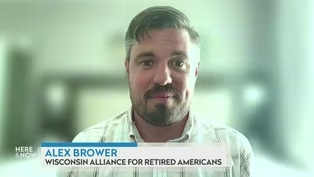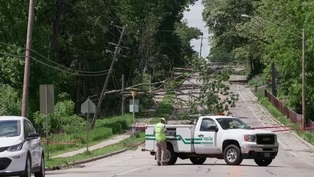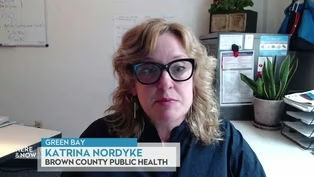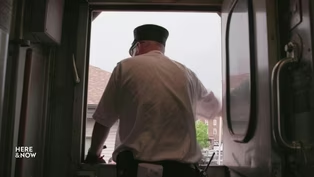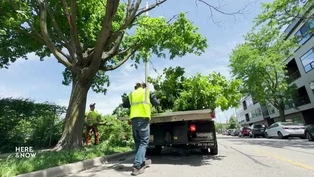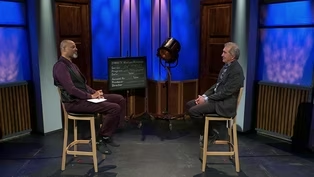Here and Now
Josh Kaul on the Latest Allotment of Opioid Settlement Money
Clip: Season 2200 Episode 2245 | 6m 43sVideo has Closed Captions
Josh Kaul explains where the next $36 million won in an opioid settlement will go.
Wisconsin Attorney General Josh Kaul explains where the next $36 million won in an opioid settlement will go, as the state is set to receive over $750 million through 2038 as a part of the deal.
Problems playing video? | Closed Captioning Feedback
Problems playing video? | Closed Captioning Feedback
Here and Now is a local public television program presented by PBS Wisconsin
Here and Now
Josh Kaul on the Latest Allotment of Opioid Settlement Money
Clip: Season 2200 Episode 2245 | 6m 43sVideo has Closed Captions
Wisconsin Attorney General Josh Kaul explains where the next $36 million won in an opioid settlement will go, as the state is set to receive over $750 million through 2038 as a part of the deal.
Problems playing video? | Closed Captioning Feedback
How to Watch Here and Now
Here and Now is available to stream on pbs.org and the free PBS App, available on iPhone, Apple TV, Android TV, Android smartphones, Amazon Fire TV, Amazon Fire Tablet, Roku, Samsung Smart TV, and Vizio.
Providing Support for PBS.org
Learn Moreabout PBS online sponsorshipWisconsin.
mi llion of Wisconsin's share of the opioid settlement funds will st art to be dispersed for the year.
Wisconsin will receive a total of $750 million over several years from settlements reached in national lawsuits against pharmaceutical companies that made opioid drugs, according to the CDC.
Wisconsin saw a 4% decrease in overdose deaths in 2023, down to a still staggering 1754 deaths.
Fentanyl and drugs laced with it account for most of the deaths.
Here to talk about how the settlement money is being put to work, state Attorney General Josh Collin, thanks very much for being here.
>> So is it too early to say whether programs funded to date with settlement funds are helping drive down these deaths?
>> Well, it's hard to know exactly how they link up to those kinds of numbers, but what I can say with a lot of confidence is that those dollars are making a difference, so when we prepared to get funds allocated for the upcoming fiscal year, the Department of Health Services secretary designee and I met with stakeholders from around the state.
We held roundtable events, and we asked people on the front lines of the fight against the opioid epidemic to tell us what's been working and where do we need more resources.
One of the things we consistently heard from folks is that these funds are making a difference.
They're filling gaps where they're needed, and I'll give you an example, Medicaid reimburses certain aspects of treatment for people who are struggling with substance use disorder, but there are parts that aren't covered that can be critical, like housing.
So getting those kinds of funds can help keep people in treatment and can help make them more successful.
Now let's be clear there are never going to be enough funds to address all the needs that we have.
But the more dollars we can get to communities, the more that we can help keep people safe and save lives.
>> Because how hard is it to release and reverse the grip of the opioid epidemic on this population?
>> It's been an enormous challenge for communities across the country.
There has been some meaningful progress made, and it's important to note that things like the Pdmp and efforts to discourage overprescription of opioids, those have made a difference.
And I think you're seeing a reversal in the trend of opioid prescriptions, which had gone up dramatically over a few decades.
On the other hand, we're dealing with the impacts of the pandemic and social isolation and more concerning, we're dealing with the impacts of fentanyl, which is now laced in all sorts of drugs and is incredibly dangerous.
>> Just the flow of fentanyl just keep coming.
And can law enforcement keep up?
>> Well, right now the volume coming in is enormous and it's mixed in all sorts of different types of drugs.
So we've got to be doing a variety of things to keep people safe.
One is we've got to make sure we are investigating and prosecuting shipping these incredibly communities.
That's one of the things we do at DOJ.
But we've also got to recognize that people are overdosing sometimes not even realizing that they're using opioids.
And so having harm reduction measures in place like fentanyl test strips and like Narcan, which are going to be funded through some of these opioid settlement funds, is also helping to save lives.
>> How angry does the role of opioid manufacturers in this scourge make you?
>> It makes me really upset.
You know, this problem would not have happened if it wasn't for the pumping up of opioid prescriptions through efforts of pharmaceutics companies.
When we filed our suit against Purdue Pharma, just months after I took office as AG, we laid out in our complaint our allegations about how this whole thing started.
You know, if you go back decades.
Opioid prescriptions were incredibly low in Wisconsin, in Wisconsin and nationwide.
But through efforts of companies like Purdue Pharma to really push opioids, to promote studies that were not actually valid, to encourage doctors to prescribe opioids, there's been a major addiction epidemic that's happened.
And the impacts that we're seeing are still to this day in significant part, being driven by that in Wisconsin.
>> Do any of the settlement monies go to individuals impact impacted the way the settlements were structured is that they are focused on abating future harm.
>> So there have been some separate legal actions involving the individuals who were impacted.
But these funds, based on the terms of the settlement, are meant to be forward looking in terms of preventing harm.
So certainly if there are people who are struggling with substance use disorder who were impacted previously, this might help them get the kind of support that they need.
But it's separate from providing the kind of compensation for somebody who is injured on another score.
>> As you well know, Arizona this week arraigned false Republican electors alleged to be part of a falsely electoral, you know, falsifying electoral documents.
What about Wisconsin's false electors who settled a civil suit?
Will you be criminally charging them?
>> Well, I can say a few things.
So first, I think it is vitally important that anybody who committed a crime with the goal of overturning the results of an election be held accountable, and there have been significant steps towards accountability through the federal prosecution of former President Trump.
That's ongoing right now.
A number of states have now brought charges at the Department of Justice.
We don't confirm or deny the existence of ongoing investigations and charging decisions that that Das ultimately make are only announced when they're happening .
But again, it's critical that anybody who committed a crime to overturn an election is held accountable.
heading into the November elections about a repeat of the aftermath of the 2020 election?
>> I think it's something we need to be vigilant about in 2020.
We knew that there were a number of threats to the security of our elections, and so we made sure to make clear to people that if there was voter intimidation at the polls or voter fraud, that people needed to expect to be held accountable.
And fortunately, in 2020, election Day went smoothly, I think a lot more smoothly than people anticipated .
And of course, we then saw significant litigation in the aftermath of that election.
I expect that we will see litigation again in the aftermath of this election in 2020.
We defended the state's voters and their choice for president, and we won every single case.
But one of those cases was 4 to 3 in our state Supreme Court.
Now, this year, I, you know, the composition of the Supreme Court has changed a bit, and we're going to be prepared to defend the results and ensure that the will of the voters is upheld.
We succeeded in 2020, and I'm confident we will again in 2024.
But we're also not going in with with any any misunderstanding that that we're not going to potentially we're not going to potentially
Alex Brower on the Social Security Funding Gap and Solutions
Video has Closed Captions
Clip: S2200 Ep2245 | 5m 41s | Alex Brower on the potential for the Social Security trust fund to be empty by 2035. (5m 41s)
Here & Now opening for May 24, 2024
Video has Closed Captions
Clip: S2200 Ep2245 | 1m 1s | The introduction to the May 24, 2024 episode of Here & Now. (1m 1s)
Katrina Nordyke on Whooping Cough Outbreak and Vaccines
Video has Closed Captions
Clip: S2200 Ep2245 | 6m 27s | Katrina Nordyk describes the extent of the Green Bay area's outbreak of whooping cough. (6m 27s)
Passenger Rail Expands Across the State with Borealis Train
Video has Closed Captions
Clip: S2200 Ep2245 | 43s | Amtrak expands passenger rail with Borealis trains running between Chicago, Minneapolis. (43s)
Storms Leave Damage and Power Outages across state, Midwest
Video has Closed Captions
Clip: S2200 Ep2245 | 42s | Severe storms bringing tornados and high wind speeds leave thousands without power. (42s)
In Focus with Pete Souza: Photographing Presidential History
Video has Closed Captions
Clip: S2200 Ep2245 | 46m 43s | Murv Seymour talks with Pete Souza about documenting history as White House photographer. (46m 43s)
Providing Support for PBS.org
Learn Moreabout PBS online sponsorship
- News and Public Affairs

Top journalists deliver compelling original analysis of the hour's headlines.

- News and Public Affairs

FRONTLINE is investigative journalism that questions, explains and changes our world.












Support for PBS provided by:
Here and Now is a local public television program presented by PBS Wisconsin
